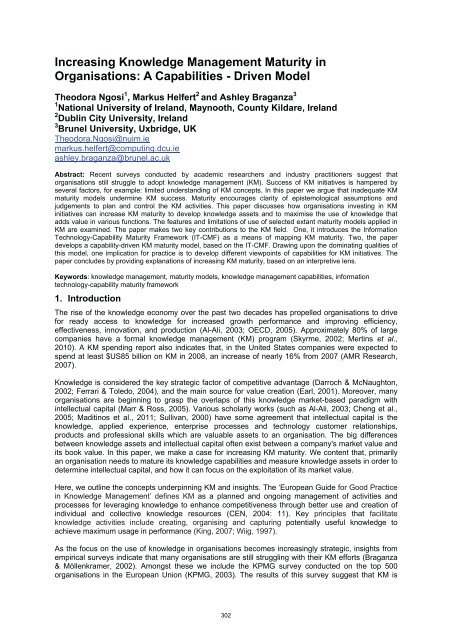Proceedings of the 3rd European Conference on Intellectual Capital
Proceedings of the 3rd European Conference on Intellectual Capital
Proceedings of the 3rd European Conference on Intellectual Capital
Create successful ePaper yourself
Turn your PDF publications into a flip-book with our unique Google optimized e-Paper software.
Increasing Knowledge Management Maturity in<br />
Organisati<strong>on</strong>s: A Capabilities - Driven Model<br />
Theodora Ngosi 1 , Markus Helfert 2 and Ashley Braganza 3<br />
1<br />
Nati<strong>on</strong>al University <str<strong>on</strong>g>of</str<strong>on</strong>g> Ireland, Maynooth, County Kildare, Ireland<br />
2<br />
Dublin City University, Ireland<br />
3<br />
Brunel University, Uxbridge, UK<br />
Theodora.Ngosi@nuim.ie<br />
markus.helfert@computing.dcu.ie<br />
ashley.braganza@brunel.ac.uk<br />
Abstract: Recent surveys c<strong>on</strong>ducted by academic researchers and industry practiti<strong>on</strong>ers suggest that<br />
organisati<strong>on</strong>s still struggle to adopt knowledge management (KM). Success <str<strong>on</strong>g>of</str<strong>on</strong>g> KM initiatives is hampered by<br />
several factors, for example: limited understanding <str<strong>on</strong>g>of</str<strong>on</strong>g> KM c<strong>on</strong>cepts. In this paper we argue that inadequate KM<br />
maturity models undermine KM success. Maturity encourages clarity <str<strong>on</strong>g>of</str<strong>on</strong>g> epistemological assumpti<strong>on</strong>s and<br />
judgements to plan and c<strong>on</strong>trol <str<strong>on</strong>g>the</str<strong>on</strong>g> KM activities. This paper discusses how organisati<strong>on</strong>s investing in KM<br />
initiatives can increase KM maturity to develop knowledge assets and to maximise <str<strong>on</strong>g>the</str<strong>on</strong>g> use <str<strong>on</strong>g>of</str<strong>on</strong>g> knowledge that<br />
adds value in various functi<strong>on</strong>s. The features and limitati<strong>on</strong>s <str<strong>on</strong>g>of</str<strong>on</strong>g> use <str<strong>on</strong>g>of</str<strong>on</strong>g> selected extant maturity models applied in<br />
KM are examined. The paper makes two key c<strong>on</strong>tributi<strong>on</strong>s to <str<strong>on</strong>g>the</str<strong>on</strong>g> KM field. One, it introduces <str<strong>on</strong>g>the</str<strong>on</strong>g> Informati<strong>on</strong><br />
Technology-Capability Maturity Framework (IT-CMF) as a means <str<strong>on</strong>g>of</str<strong>on</strong>g> mapping KM maturity. Two, <str<strong>on</strong>g>the</str<strong>on</strong>g> paper<br />
develops a capability-driven KM maturity model, based <strong>on</strong> <str<strong>on</strong>g>the</str<strong>on</strong>g> IT-CMF. Drawing up<strong>on</strong> <str<strong>on</strong>g>the</str<strong>on</strong>g> dominating qualities <str<strong>on</strong>g>of</str<strong>on</strong>g><br />
this model, <strong>on</strong>e implicati<strong>on</strong> for practice is to develop different viewpoints <str<strong>on</strong>g>of</str<strong>on</strong>g> capabilities for KM initiatives. The<br />
paper c<strong>on</strong>cludes by providing explanati<strong>on</strong>s <str<strong>on</strong>g>of</str<strong>on</strong>g> increasing KM maturity, based <strong>on</strong> an interpretive lens.<br />
Keywords: knowledge management, maturity models, knowledge management capabilities, informati<strong>on</strong><br />
technology-capability maturity framework<br />
1. Introducti<strong>on</strong><br />
The rise <str<strong>on</strong>g>of</str<strong>on</strong>g> <str<strong>on</strong>g>the</str<strong>on</strong>g> knowledge ec<strong>on</strong>omy over <str<strong>on</strong>g>the</str<strong>on</strong>g> past two decades has propelled organisati<strong>on</strong>s to drive<br />
for ready access to knowledge for increased growth performance and improving efficiency,<br />
effectiveness, innovati<strong>on</strong>, and producti<strong>on</strong> (Al-Ali, 2003; OECD, 2005). Approximately 80% <str<strong>on</strong>g>of</str<strong>on</strong>g> large<br />
companies have a formal knowledge management (KM) program (Skyrme, 2002; Mertins et al.,<br />
2010). A KM spending report also indicates that, in <str<strong>on</strong>g>the</str<strong>on</strong>g> United States companies were expected to<br />
spend at least $US85 billi<strong>on</strong> <strong>on</strong> KM in 2008, an increase <str<strong>on</strong>g>of</str<strong>on</strong>g> nearly 16% from 2007 (AMR Research,<br />
2007).<br />
Knowledge is c<strong>on</strong>sidered <str<strong>on</strong>g>the</str<strong>on</strong>g> key strategic factor <str<strong>on</strong>g>of</str<strong>on</strong>g> competitive advantage (Darroch & McNaught<strong>on</strong>,<br />
2002; Ferrari & Toledo, 2004), and <str<strong>on</strong>g>the</str<strong>on</strong>g> main source for value creati<strong>on</strong> (Earl, 2001). Moreover, many<br />
organisati<strong>on</strong>s are beginning to grasp <str<strong>on</strong>g>the</str<strong>on</strong>g> overlaps <str<strong>on</strong>g>of</str<strong>on</strong>g> this knowledge market-based paradigm with<br />
intellectual capital (Marr & Ross, 2005). Various scholarly works (such as Al-Ali, 2003; Cheng et al.,<br />
2005; Maditinos et al., 2011; Sullivan, 2000) have some agreement that intellectual capital is <str<strong>on</strong>g>the</str<strong>on</strong>g><br />
knowledge, applied experience, enterprise processes and technology customer relati<strong>on</strong>ships,<br />
products and pr<str<strong>on</strong>g>of</str<strong>on</strong>g>essi<strong>on</strong>al skills which are valuable assets to an organisati<strong>on</strong>. The big differences<br />
between knowledge assets and intellectual capital <str<strong>on</strong>g>of</str<strong>on</strong>g>ten exist between a company's market value and<br />
its book value. In this paper, we make a case for increasing KM maturity. We c<strong>on</strong>tent that, primarily<br />
an organisati<strong>on</strong> needs to mature its knowledge capabilities and measure knowledge assets in order to<br />
determine intellectual capital, and how it can focus <strong>on</strong> <str<strong>on</strong>g>the</str<strong>on</strong>g> exploitati<strong>on</strong> <str<strong>on</strong>g>of</str<strong>on</strong>g> its market value.<br />
Here, we outline <str<strong>on</strong>g>the</str<strong>on</strong>g> c<strong>on</strong>cepts underpinning KM and insights. The ‘<str<strong>on</strong>g>European</str<strong>on</strong>g> Guide for Good Practice<br />
in Knowledge Management’ defines KM as a planned and <strong>on</strong>going management <str<strong>on</strong>g>of</str<strong>on</strong>g> activities and<br />
processes for leveraging knowledge to enhance competitiveness through better use and creati<strong>on</strong> <str<strong>on</strong>g>of</str<strong>on</strong>g><br />
individual and collective knowledge resources (CEN, 2004: 11). Key principles that facilitate<br />
knowledge activities include creating, organising and capturing potentially useful knowledge to<br />
achieve maximum usage in performance (King, 2007; Wiig, 1997).<br />
As <str<strong>on</strong>g>the</str<strong>on</strong>g> focus <strong>on</strong> <str<strong>on</strong>g>the</str<strong>on</strong>g> use <str<strong>on</strong>g>of</str<strong>on</strong>g> knowledge in organisati<strong>on</strong>s becomes increasingly strategic, insights from<br />
empirical surveys indicate that many organisati<strong>on</strong>s are still struggling with <str<strong>on</strong>g>the</str<strong>on</strong>g>ir KM efforts (Braganza<br />
& Möllenkramer, 2002). Am<strong>on</strong>gst <str<strong>on</strong>g>the</str<strong>on</strong>g>se we include <str<strong>on</strong>g>the</str<strong>on</strong>g> KPMG survey c<strong>on</strong>ducted <strong>on</strong> <str<strong>on</strong>g>the</str<strong>on</strong>g> top 500<br />
organisati<strong>on</strong>s in <str<strong>on</strong>g>the</str<strong>on</strong>g> <str<strong>on</strong>g>European</str<strong>on</strong>g> Uni<strong>on</strong> (KPMG, 2003). The results <str<strong>on</strong>g>of</str<strong>on</strong>g> this survey suggest that KM is<br />
302
















